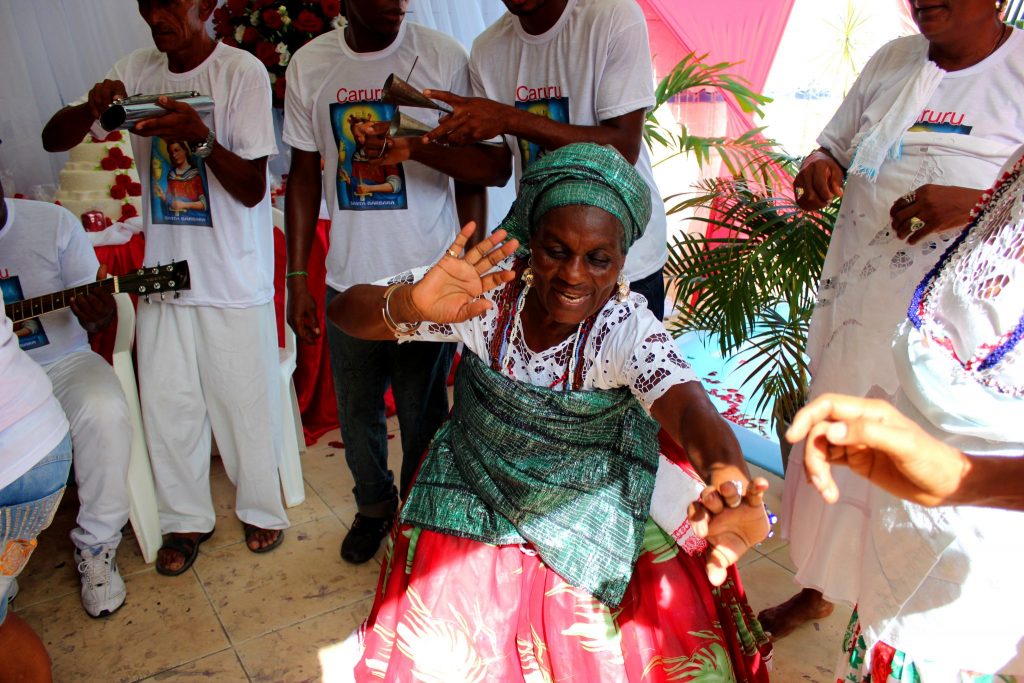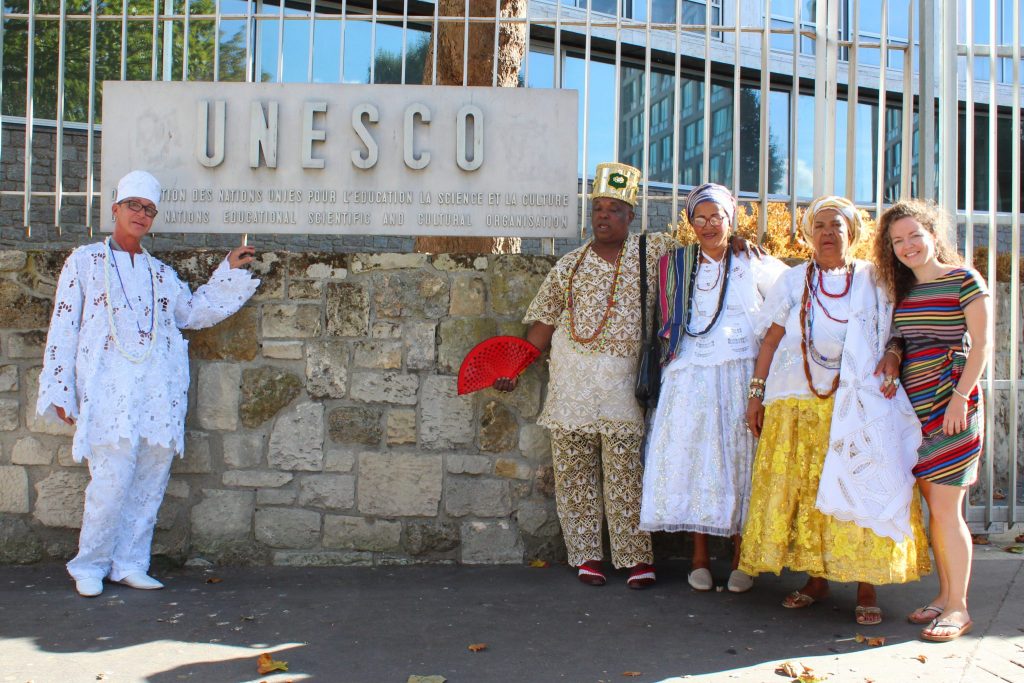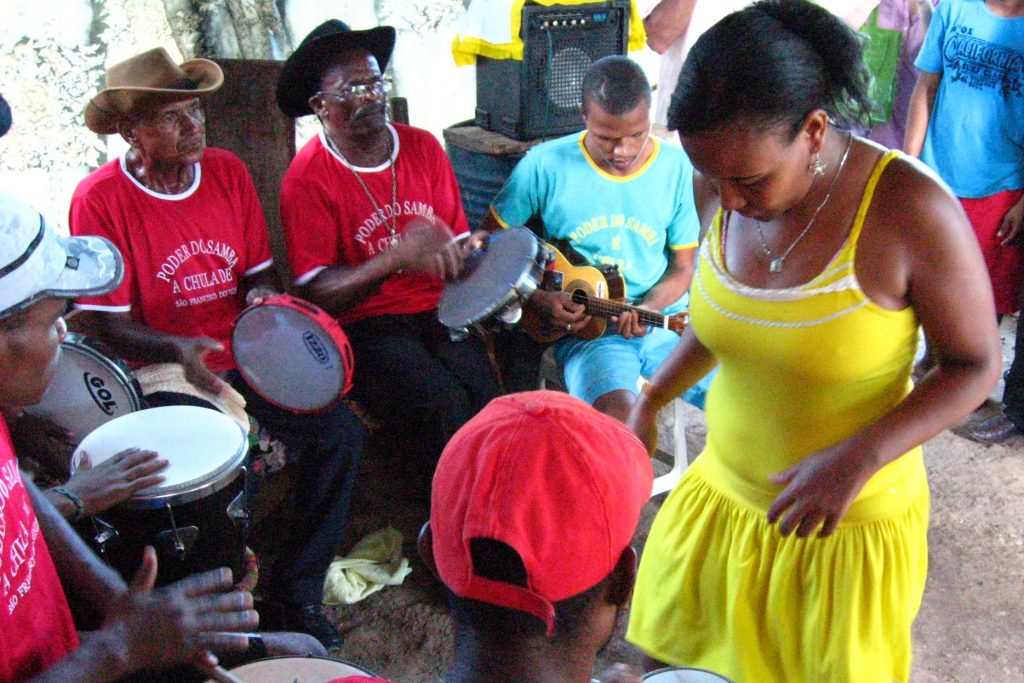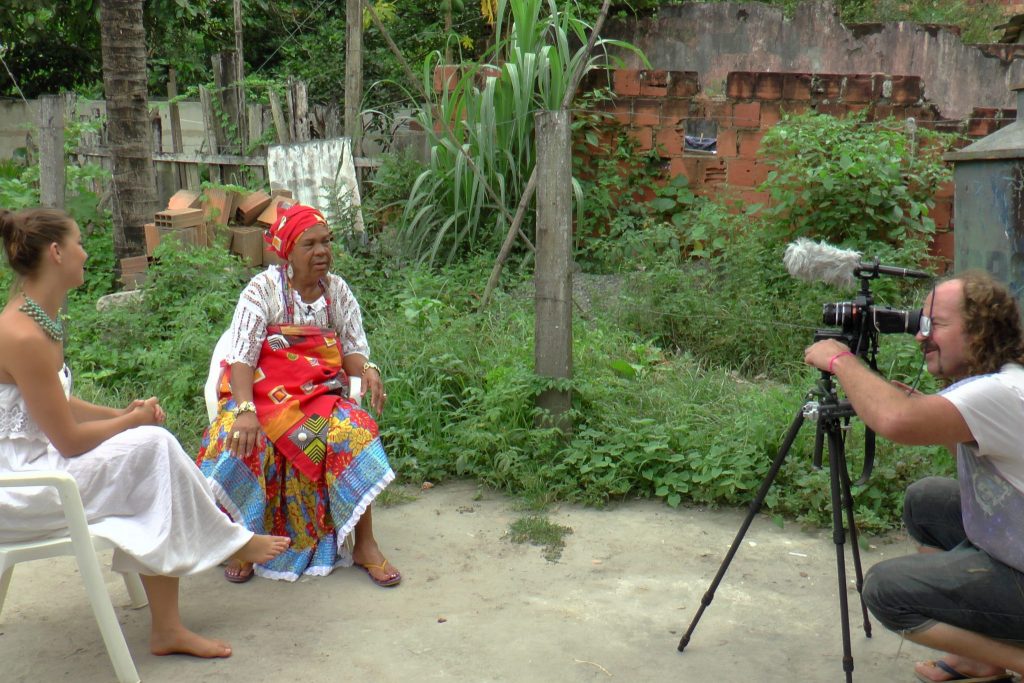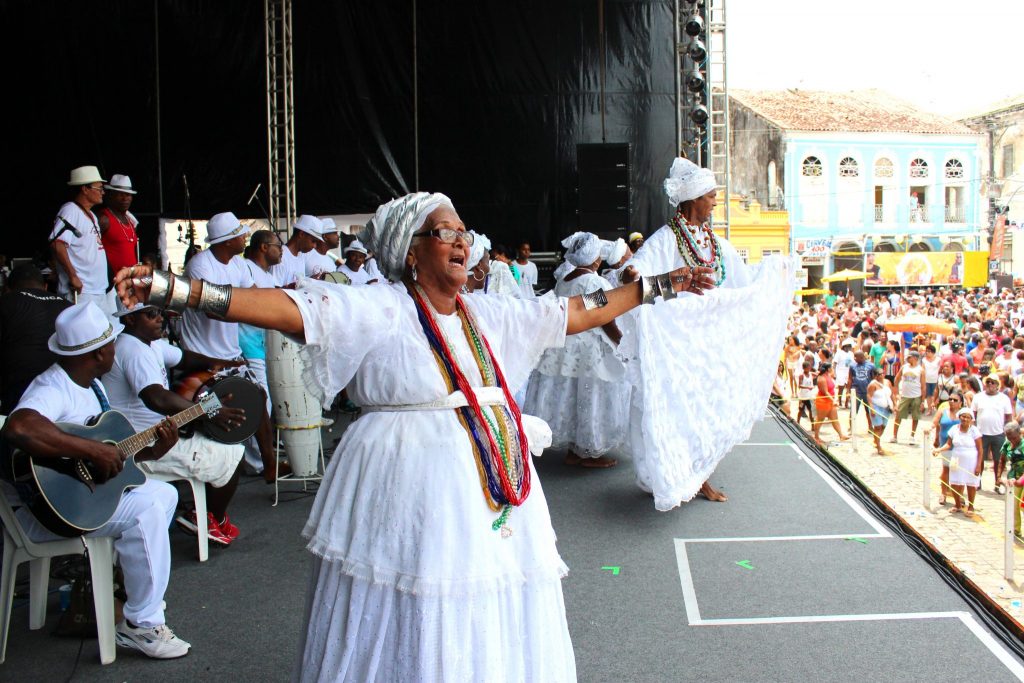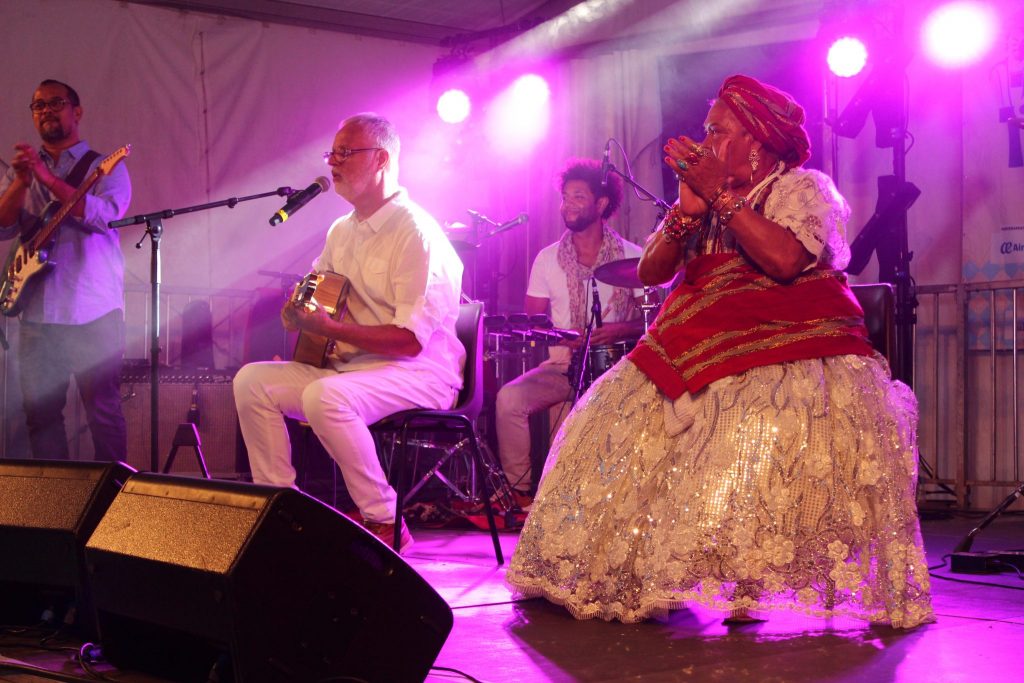Photos: 1. Dona Edinha e grupo Nicinha do Samba e Raízes de Santo Amaro. Arembepe-BA, December 2014. ©Nina Graeff. 2: Pai Gel, Pai Poty, Egbomi Vilma, Nicinha do Samba de Nina Graeff. Paris, September 2016. ©Nitzan Meilin. 3: grupo Samba Chula Poder do Samba. Muritiba, March 2010. ©Nina Graeff. 4: Nicinha do Samba e Raízes de Santo Amaro e Pai Gilson na Festa da Purificação. Santo Amaro-BA, January 2015. ©Nina Graeff. 5: Nicinha do Samba e Roberto Mendes na Lavage de la Madeleine. Paris, September 2016. ©Nina Graeff
Post-doc Research “Tons de Machete – revitalization of five machete-guitar playing techniques”
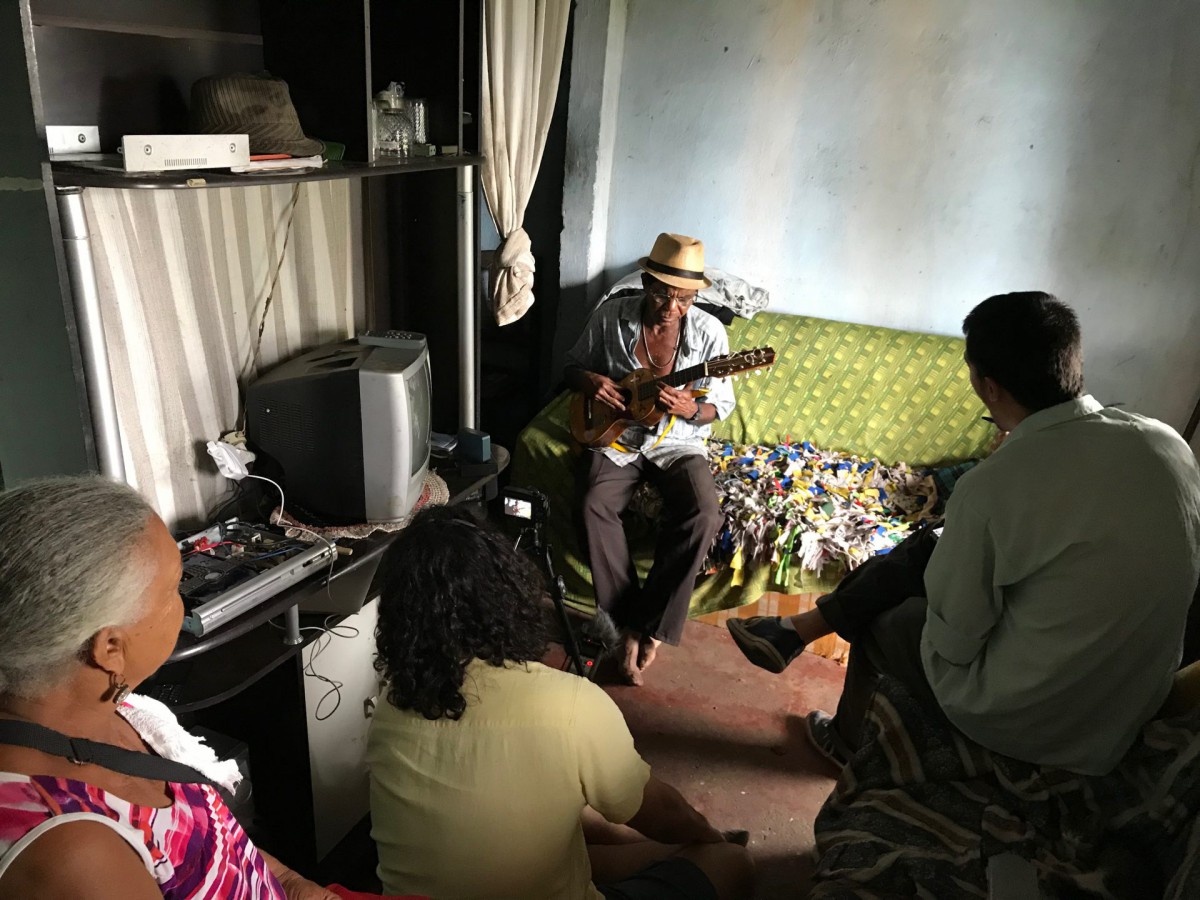
Nicinha do Samba, Caio Csermak, Mestre Aurino de Maracangalha (playing machete), and Mário Lamparellli. Maracangalha, September 2019. ©Nina Graeff
The research project aimed at reviving five guitar playing techniques of the samba de roda from Bahia, Brazil, the “tons de machete”, as played by the deceased master João da Viola. Therefore, archive material from the 1980s was repatriated towards a revaluation of the tradition within its new context as UNESCO’s Intangible Cultural Heritage. The machete guitar and its “tons” conveyed diverse symbolic, aesthetic, religious, historic as well as ethnic values, which mostly disappeared with the decease of its last masters. To revive this forgotten knowledge means to restore it from the very agency of a material object, by making it sound again and its values resound in the materiality of a place and of practitioners’ bodies. Together with cultural bearers, the most adequate and sustainable forms of transmitting the practice from the archive material were developed as well as implemented during ethnographic fieldwork. How can the agency of a musical instrument within the community be restored, strengthening its traditional values through the reactivation of an extinct practice? Does it lead to a full new practice, fostering musical creativity? And how are the interactions between “archive” and “repertoire”, theory and practice, researcher and musicians?
Link to the research project
Master Research on Samba de Roda from Recôncavo da Bahia, Brazil
The master thesis in German “General and rhythmic principles of Samba de Roda from Recôncavo Baiano” investigated one of the oldest Afro-Brazilian traditions, the samba de roda (circle samba) from Recôncavo da Bahia, which was proclaimed “Oral and Intangible Cultural Heritage of Humanity” by UNESCO in 2005. It based on two ethnographic fieldwork trips in 2010 and on systematic musical analysis. While dedicating a subchapter for dance analysis, it focuses on musical and especially rhythmic analysis of audio-visual recordings from different sources and epochs. Therefore, it brings up theories and analytical methods for the study of African music still scantly disseminated within Afro-Brazilian music research. These enable a broader understanding of samba de roda’s typical features and different styles, of some evident changes within the nomination’s context and of its similarities to samba from Rio de Janeiro from the beginning of the 20th century, of which origins musicians attribute to Bahia.
Arising at an important moment in Brazil, in which marginalized cultures begin to receive political and public appreciation, this study contributes to the academic recognition of a rich music and dance practice that lies in the heart of Bahians and is the heart of many Afro-Brazilian traditions.
Keywords: Afro-Brazilian music, samba de roda, Intangible Cultural Heritage, dance, rhythm analysis.
Department: Transcultural Music Studies Chair, University of Music Franz Liszt Weimar & Friedrich Schiller University Jena
Supervisors: Tiago de Oliveira Pinto and Gerhard Kubik
Submission: August 2011
Result: Very good with distinction
Publications
- GRAEFF, Nina. 2012. „Reflexos da nomeação do samba de roda como Obra-Prima da Humanidade pela UNESCO sobre a cultura do Recôncavo Baiano”, in: Musics and knowledge in Transit / Músicas e saberes em trânsito / Músicas y saberes en tránsito, ed. by Susana Moreno Fernández, Pedro Roxo e Iván Iglesias. Lisboa: Colibri. n.n.
- GRAEFF, Nina; PINTO, Tiago de Oliveira. 2012. „Música entre materialidade e imaterialidade: os tons-de-machete do Recôncavo Baiano / Music between Tangibility and Intangibility: the tons-de-machete from Recôncavo Bahiano”, in:Revista MOUSEION11/1 (Jan-Apr. 2012). Link
- GRAEFF, Nina. 2013. „Samba de Roda: comemorando identidades afro-brasileiras”, in: Artelogie 4, (Jan. 2013). Link
- GRAEFF, Nina. 2013. “Experiencing Music and Intangible Cultural Heritage: Some Thoughts on Safeguarding Music’s Intangible Dimension”, In: El oído pensante 2 (Aug. 2013). Link
- GRAEFF, Nina. 2014. “Fundamentos rítmicos africanos para a pesquisa da música afro-brasileira: o exemplo do Samba de Roda”. Música e Cultura 9 (2014). Link
- GRAEFF, Nina. 2015. „Afro-brasilianische Götter in Deutschland? Immaterielles Kulturerbe weitergeben“, Deutsche UNESCO Kommission. Link
- GRAEFF, Nina. 2015. Os ritmos da roda. Tradição e transformação no samba de roda. Salvador: EDUFBA. Link
- GRAEFF, Nina. 2016. “Samba de Roda as Heritage: From samba in the living room to ‘Masterpiece of Humanity”, in: Die Tonkunst 10/4 (Oct. 2016).
- GRAEFF, Nina. 2018. „Rhythmische Strukturen des Samba de Roda aus dem Recôncavo Baiano, Brasilien“, in: Berichte aus dem ICTM-Nationalkomitee Deutschland2011 vol. XX-XXI, edited by Dorit Klebe and Klaus Näumann. Aachen: Shaker Verlag. 91–104.
- CSERMAK, Caio; GRAEFF, Nina. 2018.“O mesmo samba”: a profissionalização dos sambas de Cachoeira e sua reificação em grupos de samba de roda”, In: Revista Pontos de Interrogação8/2. 27–50. Link
Book “Os Ritmos da Roda”
The master thesis was translated and extended into the book “Os Ritmos da Roda – Tradição e Transformação no Samba de Roda” (the rhythms of the circle – tradicion and transformation of samba de roda), being published in 2015 by EDUFBA, the publisher of the Federal University of Bahia.
Publisher: EDUFBA
City of Publication: Salvador
Year of Publication: 2015.
Format: paperback, 164 pages with transcriptions
Language: Portuguese
ISBN: 978-85-232-1437-1
Price: R$ 28,00
Publisher site: http://www.edufba.ufba.br/contato/
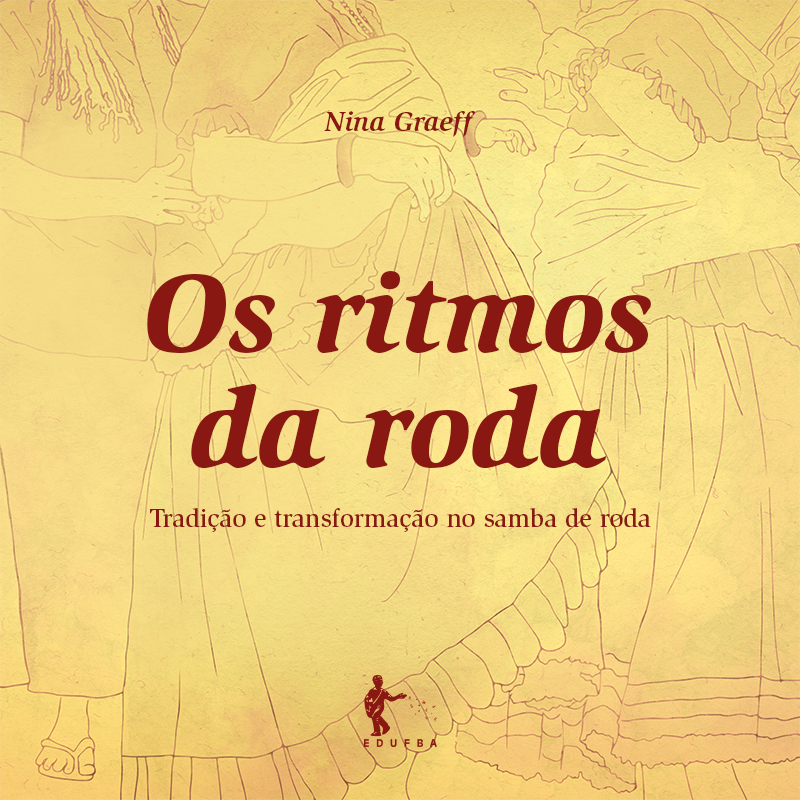
I am text block. Click edit button to change this text. Lorem ipsum dolor sit amet, consectetur adipiscing elit. Ut elit tellus, luctus nec ullamcorper mattis, pulvinar dapibus leo.


